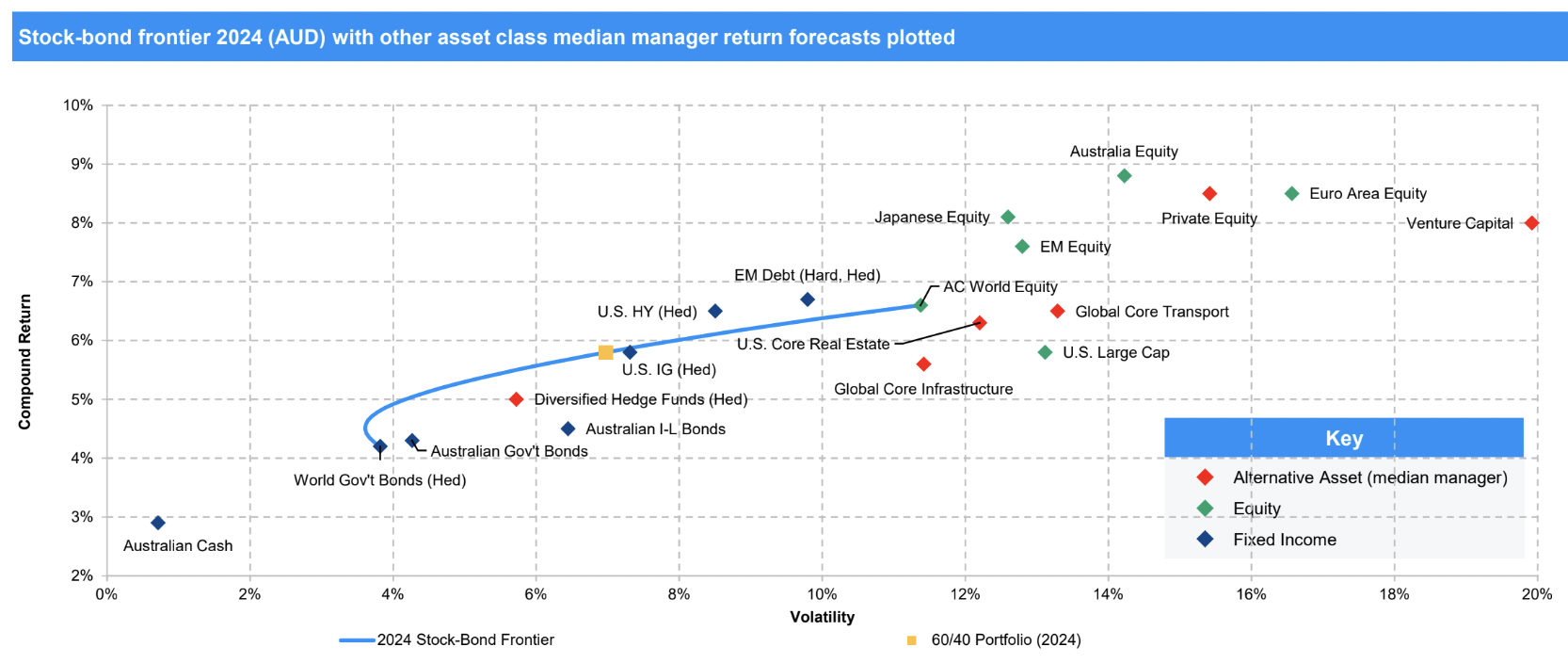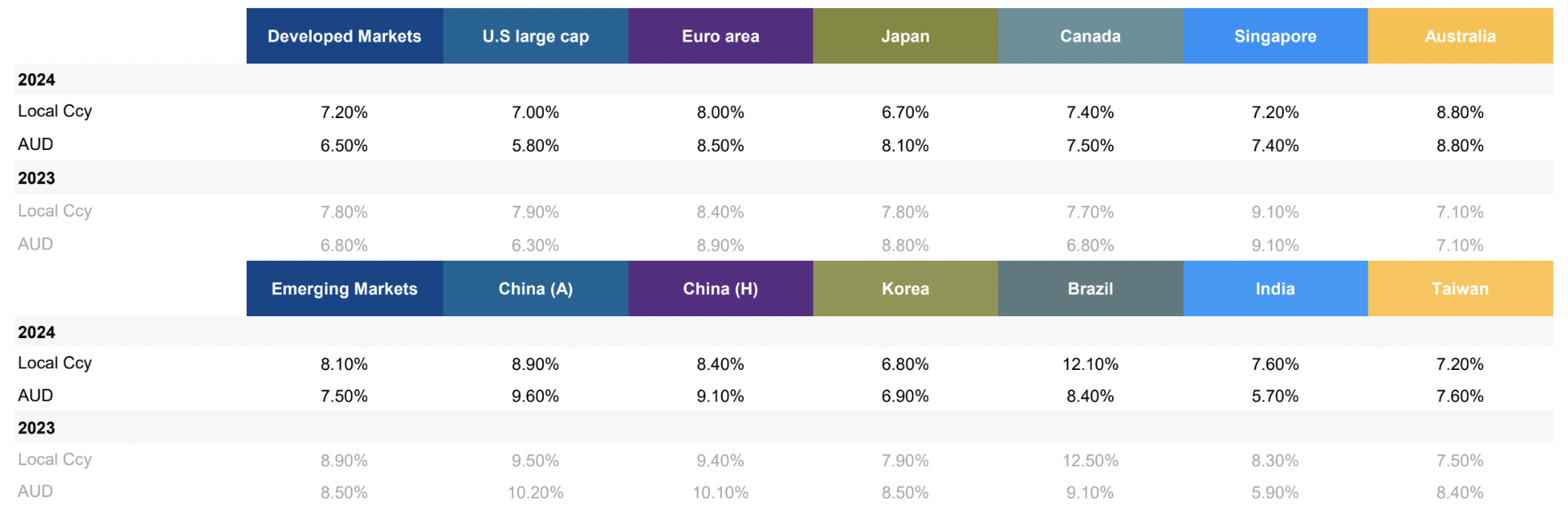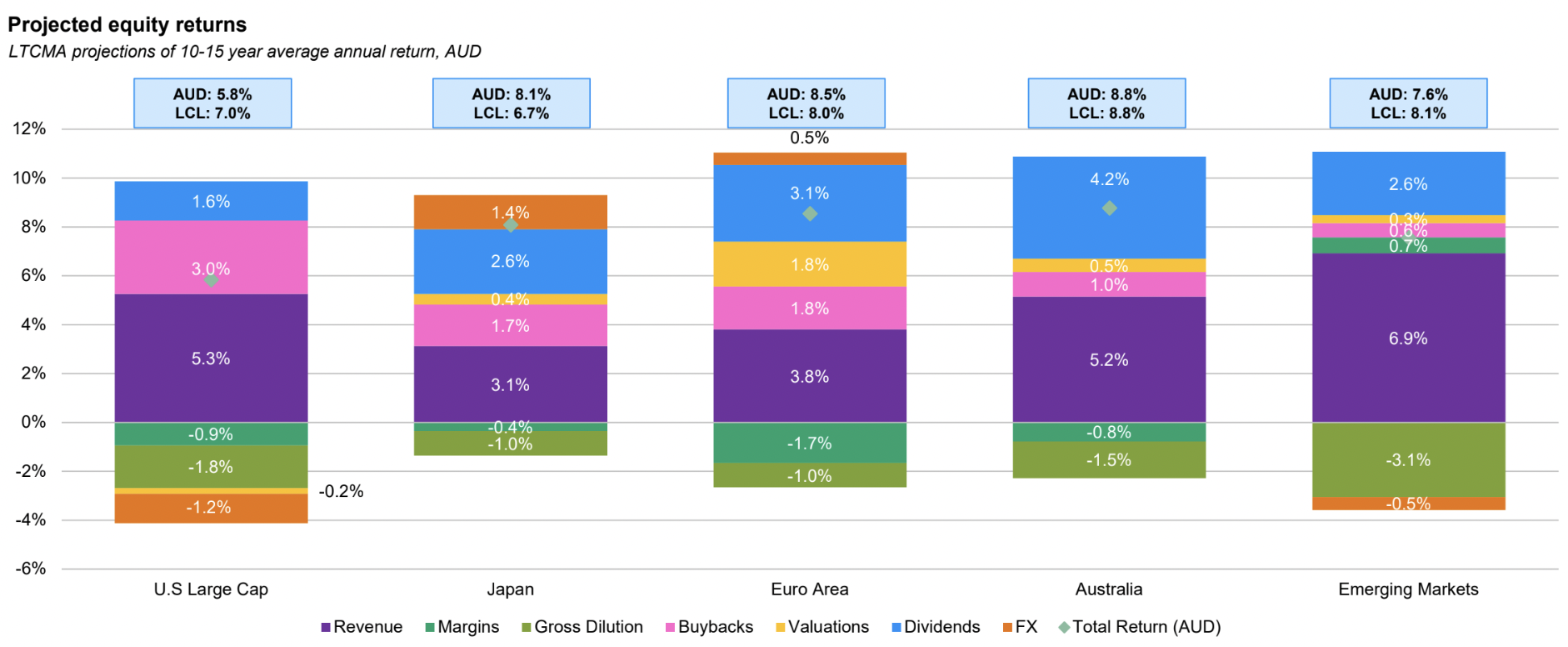Why the ASX will outperform US stocks over the next 15 years
2023 was meant to be the year when the standard 60/40 portfolio would experience a major shakeup. Well, it did - just not in the way that many investors expected. It was US mega-cap tech that did all the heavy lifting while bonds continued to struggle in the face of an extended rate hiking cycle from central banks.
But all that may be about to change in a big way, argues J.P. Morgan Asset Management. As part of its annual Long Term Capital Market Assumptions report, strategists argue that 2024 could see the best year for global bond returns since 2010. The same report also suggests that the ASX 200 has the potential to outperform both American large-caps and the benchmark developed market equities index over the next 15 years on a total return basis.
So how did they reach this conclusion and how will portfolio construction change next year? In this wire, I'll share their key insights.
The key chart
Australian equities will offer the best risk/reward value on an Australian Dollar basis starting in 2024

Key Points
Note: All forecasts are meant to be treated as starting in 2024 and lasting for 10-15 years. All these forecasts are revised every year when the LTCMA is revised.
- The average 60% equities/40% bonds portfolio (in US Dollar terms) should return 7% per annum - that's 20bps less than last year's forecast but still thrashes pure-cash returns
- Global GDP growth and global inflation forecasts for the next 15 years are upgraded by 0.1% to 2.4% and 2.9% respectively.
- Sustainability and "higher for longer" inflation expectations are likely to drive a new period of upside risks for inflation
- Government bonds could experience their best returns since 2010
- Australian equities (+8.8%) are projected to outperform US large caps (+5.8%), developed markets (+6.5%), and emerging markets +7.5%) benchmark equities on AUD basis
- Within alternatives, real estate and REITs are likely to perform better while hedge fund returns will likely decline (albeit moderately)
The world is in transition
The title of this year's paper is "Smarter Portfolios for a World in Transition", and argues that financial markets will be greatly affected by a world experiencing economic, political, technological, and environmental transition.
Some of the transitions are positively viewed. For instance, the boom in interest around AI and automation is likely to provide downside risks for inflation and support US equities (especially in that mega-cap tech area).
And while the highly positive stock-bond correlation which started in 2022 is here to stay for now, it does present an even bigger chance for portfolios to transition away from a traditional 60/40 portfolio into one that includes alternative investments.
"So investors need to add diversifiers like alternatives into their portfolios. Real assets can grow cash flows, hedge funds can short, and alternative credit [strategies] have floating rates. The diversification is becoming more and more essential as well," Pulkit Sharma, J.P. Morgan Asset Management's Head of Alternatives Investment Strategy and Solutions Business said.
But other transitions, like sustainability, are likely to add upside risks for inflation. Loose fiscal policy, exacerbated by the COVID-19 pandemic will also likely be inflation-accretive - or at least not lead to a return to austerity.
"One of the legacies from COVID and from the pandemic is the willingness of governments to spend money and to move away from austerity," Kerry Craig, J.P. Morgan Asset Management Global Market Strategist said.
This willingness to spend will particularly affect fixed income investors, who are affected by each new government bond issuance or auction.
The biggest (and most surprising) change
The JPMAM team's latest equity market forecasts continue to suggest that there are still buying opportunities in parts of the global equity market.
But in a major shift, the expected return for Australian equities is significantly higher than this time last year. The ASX's upside difference between 2023's long term forecast and 2024's long term forecast is the largest of all the major regions covered by the team.

The reasons for this outperformance are three-fold. On the one hand, margins at the aggregate level are likely to fall by less in Australia than in many other jurisdictions even as revenues hold up relatively strong.
At the moment, data compiled by Rob Crookston at WILSONS Advisory suggests the number of earnings downgrades from ASX 200 companies is now exceeding earnings upgrades, especially among cyclical stocks. This, according to Crookston, is a pattern typical to that of the 10 years before COVID.
But the real driver for total returns will be dividends - projected to add more than 4% to the ASX's total return profile - one percentage point more than its nearest rival on an Australian Dollar basis.

Finally, US equity valuations, which have led the pack for more than a decade, have been buoyed by corporate and macro tailwinds. But with valuations already so high, the team argue that this year's tailwind will be mitigated next year and beyond.
"So actually, last year, we basically had a view that even in the US, valuations were cheap and that was going to be a tailwind to returns. Because those valuations have adjusted so much, the US, in our minds is no longer cheap but it's just around fair value," Leon Goldfeld, J.P. Morgan Asset Management Head of Multi-Asset Solutions for Asia Pacific said.
So what's the catch?
The macroeconomic environment in Australia is resilient but another RBA rate hike can jeopardise that, as Craig explained.
"We are not anticipating a recession in Australia in the near term as we see support from the rise in net migration and the easing on consumer wallets from falling inflation in the year ahead. This doesn’t imply spectacular growth by any means and think that the economy will run below potential in the coming year," he said.
"We don’t think that the RBA would need to hike rates again but the bias is for tighter policy rather than looser. A further rate hike would increase the chance of a recession given it implies stickier inflation and greater headwind to economic activity."
The upshot is that one additional rate hike will probably not alter the 15-year scenario for equities and bonds presented in this report.
"From a cyclical point of view, if equity valuations fell in response to a hike by the RBA, then the cyclical component of the return may change but not the cycle neutral return which is more important for strategic asset allocation," Craig added.
You can access a full copy of the JP Morgan report (all 150 pages of it) here.
2 topics

